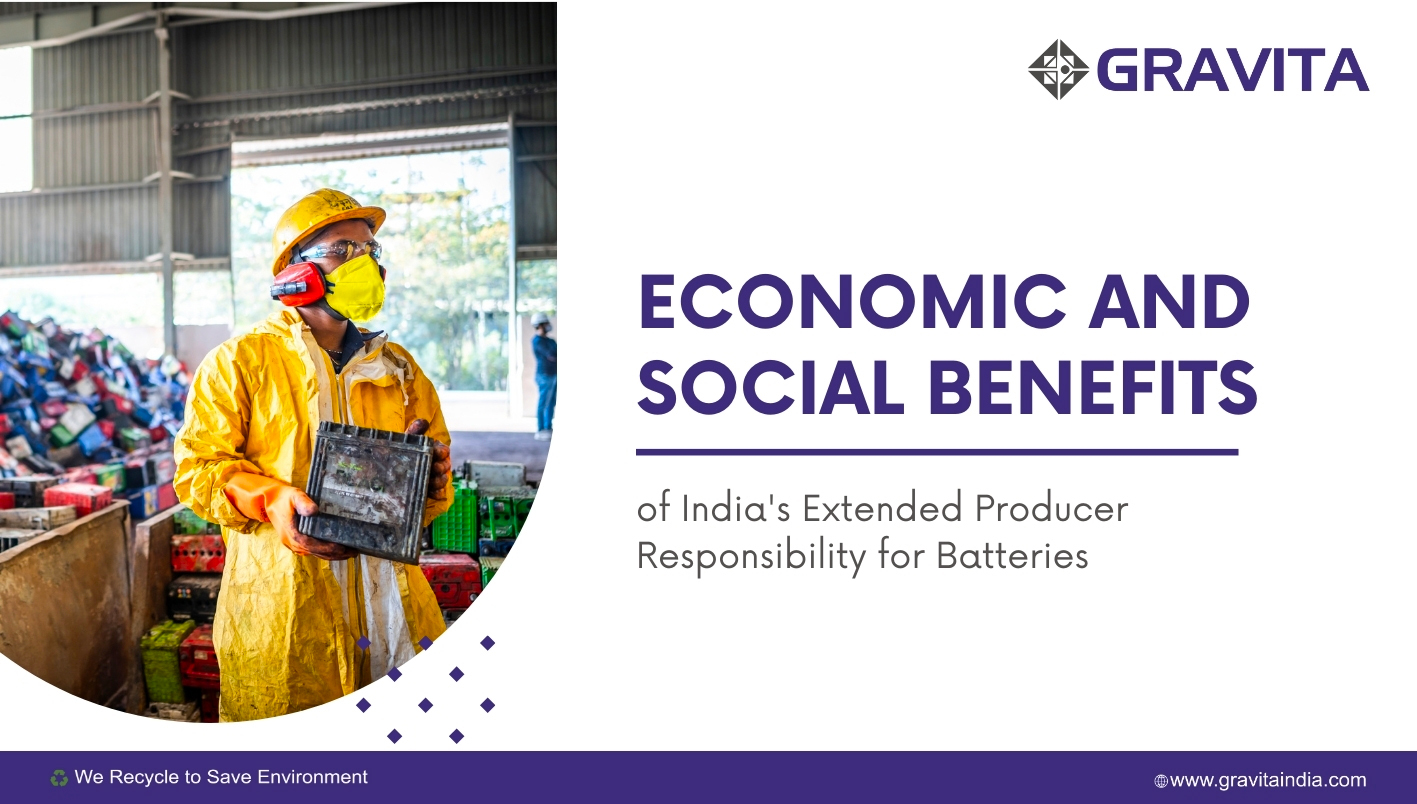India's rapid industrialization and urbanization have brought numerous economic benefits and improvements in the quality of life. However, they have also resulted in significant environmental challenges, one of which is the management of electronic waste, particularly batteries. Batteries are an integral part of modern life, powering everything from smartphones to electric vehicles. However, their disposal poses serious environmental and health risks due to the hazardous materials they contain. To address this issue, India has implemented Extended Producer Responsibility (EPR) regulations for batteries. This policy holds producers accountable for the entire lifecycle of their products, including end-of-life management. The EPR framework for batteries in India offers substantial economic and social benefits, promoting sustainable development and environmental stewardship.

Economic Benefits
1. Job Creation and Economic Growth
Implementing EPR for batteries necessitates the development of an efficient collection, recycling, and disposal infrastructure. This infrastructure development translates into numerous job opportunities across various sectors, including logistics, recycling, and manufacturing. By fostering a robust recycling industry, EPR policies can stimulate economic growth and reduce unemployment rates. The burgeoning recycling industry not only provides direct employment but also supports ancillary industries, thereby creating a multiplier effect on the economy.
2. Resource Conservation and Cost Savings
Valuable metals including lead, nickel, cobalt, and lithium are found in batteries. Recycling these materials can significantly reduce the need for virgin raw materials, which are often imported at high costs. By promoting recycling, EPR helps conserve natural resources and reduces the economic burden associated with raw material procurement. Additionally, the cost savings from reduced raw material imports can be redirected toward other critical areas of the economy, fostering overall economic resilience and sustainability.
3. Innovation and Technological Advancements
EPR regulations encourage producers to design batteries with longer lifespans, enhanced recyclability and reduced environmental impact. This push for eco-design fosters innovation and technological advancements within the industry. Companies that invest in sustainable product design and efficient recycling technologies can gain a competitive edge in the market, leading to increased profitability and market share. Moreover, the development of advanced recycling technologies can position India as a global leader in the recycling industry, attracting foreign investments and boosting economic growth.
Social Benefits
1. Improved Public Health
Improper disposal of batteries can lead to the release of toxic substances such as lead, cadmium, and mercury into the environment, posing severe health risks to communities. By ensuring proper collection and recycling of batteries, EPR regulations help mitigate these health hazards. Cleaner environments lead to healthier communities, reducing the incidence of diseases associated with toxic exposure. This, in turn, lowers healthcare costs and improves the overall quality of life for the population.
2. Environmental Protection and Sustainability
EPR policies promote sustainable waste management practices, which are crucial for environmental protection. By reducing the volume of batteries ending up in landfills or being incinerated, EPR helps minimize soil and water contamination. Sustainable waste management practices also reduce greenhouse gas emissions, contributing to the fight against climate change. A healthier environment supports biodiversity and ensures the availability of natural resources for future generations, aligning with the principles of sustainable development.
3. Consumer Awareness and Participation
EPR initiatives often include educational campaigns aimed at raising consumer awareness about the importance of proper battery disposal and recycling. Increased awareness leads to higher participation rates in recycling programs, fostering a culture of environmental responsibility among citizens. Engaged and informed consumers are more likely to support and comply with environmental regulations, enhancing the overall effectiveness of EPR policies.
4. Community Development
The implementation of EPR can also drive community development by involving local communities in collection and recycling activities. Community-based recycling programs can provide income-generating opportunities, especially in rural areas where employment options are limited. Additionally, these programs can strengthen social cohesion by encouraging community members to work together towards a common environmental goal.
India's Extended Producer Responsibility for batteries is a forward-thinking policy that offers numerous economic and social benefits. By fostering job creation, resource conservation, innovation, and public health, EPR contributes to sustainable economic growth and improved quality of life. Moreover, the environmental protection and community development aspects of EPR ensure that the benefits are both far-reaching and inclusive. As India continues to implement and refine its EPR regulations, it sets a valuable precedent for other nations grappling with the challenges of electronic waste management. The success of EPR in India underscores the importance of holistic and proactive approaches to environmental sustainability, paving the way for a greener and more prosperous future.



